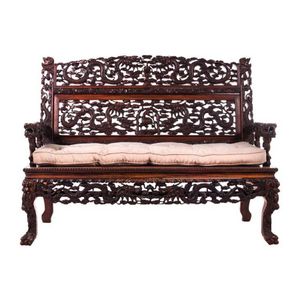French Chinoiserie Fruitwood Bench, Viardot, 1880
You must be a subscriber, and be logged in to view price and dealer details.
Subscribe Now to view actual auction price for this item
When you subscribe, you have the option of setting the currency in which to display prices to $Au, $US, $NZ or Stg.
- Circa - A Latin term meaning 'about', often used in the antique trade to give an approximate date for the piece, usually considered to be five years on either side of the circa year. Thus, circa 1900 means the piece was made about 1900, probably between 1895 and 1905. The expression is sometimes abbreviated to c.1900.
- Attributed - A cataloguing term where the item in the opinion of the cataloguers, is a of the period of the artist, craftsman or designer, and which probably in whole or part is the work of that person.
- Fruitwood - A catch-all term used to describe the wood of any of several fruit-bearing trees, such as the apple, cherry, or pear, used especially in cabinetmaking.
With a blond colour when finished, fruitwood was used in Europe, especially France, in the 18th and 19th centuries for larger items of furniture such as tables, chairs, cabinets and bookcases but in England its use was generally restricted to decorative elements such as inlays. - Chinoiserie - Furniture and decorative items decorated in imitation of a Western interpretation of the Chinese style. The Chinoiserie style first became popular in the late 17th century, though there were frequent revivals, notably by Chippendale (hence 'Chinese Chippendale') during the Regency period, and the Anglo-Japanese style in the second half of the 19th century.
The ubiquitous 'willow pattern' is the most common 'Chinese' theme used in porcelain, while on furniture the Chinoiserie style usually has black or red painted and lacquered decoration, though the hallmark of the furniture style is the use of fretwork in geometrical patterns, pagodas and other decorative forms.
Japonaiseries, as the name implies, are motifs in imitation of the Japanese taste.
See also "Chinese Chippendale".
This item has been included into following indexes:
Visually similar items

A Chinese export ware settee & matching armchair late Qing Dynasty (1644-1912), late 19th century, each heavily carved and pierced with dragon & cloud motifs, flanked by dragon head armrests

Victorian style davenport desk, with lift top writing surface & fitted interior, lift lid stationery compartment & 4 drawers to each side and single door cabinet at front, 74 cm wide, 90 cm high approx

A Chinese carved hardwood settee c.1930's the back with a blue and white painted porcelain plaque, height 91 cm, width 116 cm, depth 62 cm

Italian hand painted bombe chest, shaped top with faux marble finish, two short drawers above two long drawers raised on cabriole legs, gilt highlighting, together with two similar bombe shaped side tables (3). Height 82 cm width 99 cm depth 40 cm height 6
